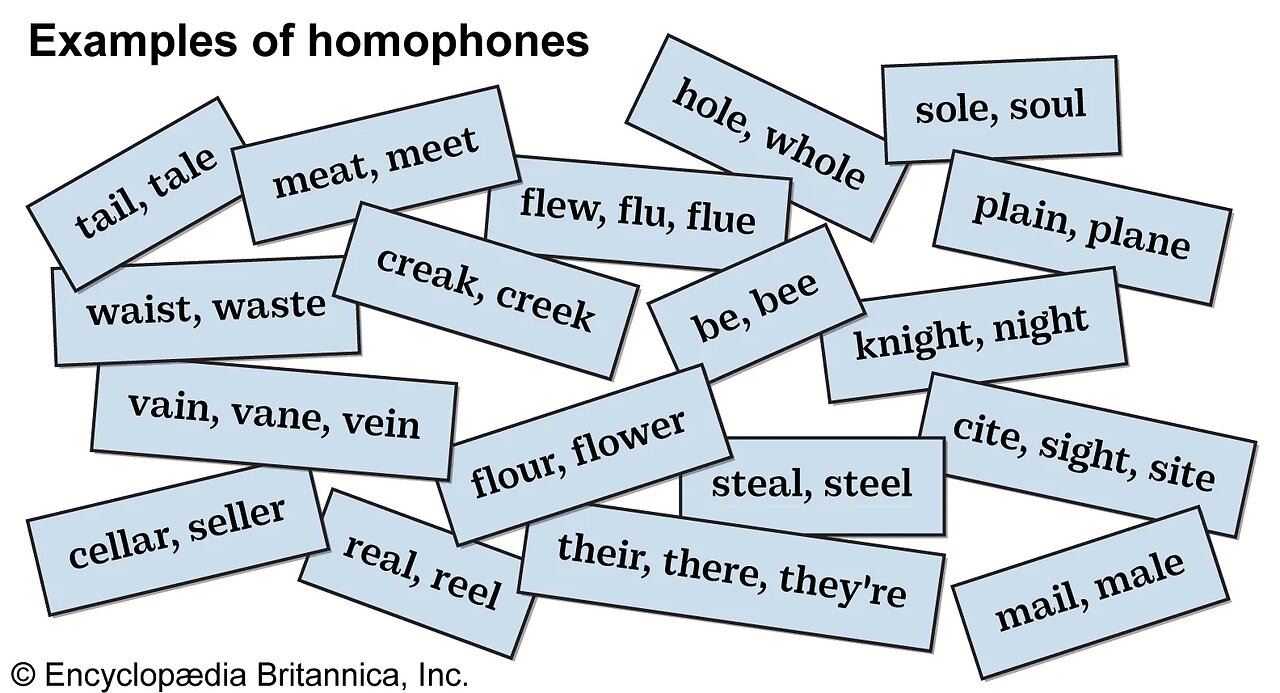Premium Only Content

PIECE vs. PEACE: How-to Use : Homophones Made Easy: PIECE vs. PEACE
PIECE vs. PEACE: How-to Use : Homophones Made Easy: PIECE vs. PEACE
Homophones are words in the English language that sound the same when spoken but have different meanings and often different spellings. They can be a bit tricky, especially for students learning English as a second language, but understanding them is important for clear communication. Here's a more detailed explanation:
1. Sound the Same: Homophones are words that are pronounced in the same way, or they have very similar pronunciations. This means that when you say them out loud, they sound identical, even though they may be spelled differently.
2. Different Meanings: Despite sounding the same, homophones have different meanings. Each word has its own unique definition and usage in sentences. This is why it's crucial to understand which homophone to use in a particular context to convey the intended meaning.
3. Different Spellings: Homophones are often spelled differently from each other. In some cases, the spelling may be quite similar, but there are usually subtle differences. These differences in spelling are what distinguish one homophone from another.
4. Common Examples: Homophones are common in the English language. Some well-known examples include "there," "their," and "they're," which all sound the same but have different meanings and spellings.
5. Context Matters: To choose the correct homophone in a sentence, you need to consider the context or the words around it. Understanding the context helps you determine which homophone is appropriate to convey the intended message.
6. Practice is Key: Learning homophones can be challenging, but with practice and exposure to the language, you can become proficient at using them correctly. Reading, listening, and speaking in English are all helpful ways to improve your understanding of homophones.
7. Common Homophones: There are many sets of homophones in English, such as "to," "too," and "two," "its" and "it's," "your" and "you're," "where" and "wear," and many more. Each set has distinct meanings and uses.
8. Clear Communication: Understanding and using homophones correctly is essential for clear and effective communication in English. Using the wrong homophone in a sentence can lead to misunderstandings, so it's important to pay attention to these words.
In summary, homophones are words in English that sound the same but have different meanings and spellings. Learning to distinguish and use them correctly is an important aspect of improving your English language skills, especially for those studying English as a second language. Practice and exposure to the language will help you become more confident in using homophones in your writing and speaking.
-
 1:01:17
1:01:17
The StoneZONE with Roger Stone
4 hours agoChristmas Edition: Why the Panama Canal is Part of the America First Agenda | The StoneZONE
16.9K14 -
 LIVE
LIVE
LFA TV
15 hours agoLFA TV CHRISTMAS EVE REPLAY
472 watching -
 LIVE
LIVE
tacetmort3m
22 hours ago🔴 LIVE - THE ZONE KEEPS PULLING ME BACK - STALKER 2 - PART 15
892 watching -
 22:45
22:45
Brewzle
11 hours agoI Went Drinking In A Real Bourbon Castle
16.2K1 -
 48:36
48:36
PMG
1 day ago $0.72 earned"Parkland Parent Speaks Out On Kamala Harris Using Victims"
11.1K2 -
 4:06
4:06
The Lou Holtz Show
10 hours agoCoach Lou Holtz’s Heartfelt Christmas Message 🎄 | Family, Faith & Notre Dame Spirit 💚 #christmas
8.39K -
![ROSEANNE BARR - Her Journey, TRUMP, and the MAGA GOLDEN AGE! [INTERVIEW]](https://1a-1791.com/video/s8/1/M/m/B/2/MmB2v.0kob.1-small-ROSEANNE-BARR-Her-Journey-T.jpg) 51:35
51:35
Dr Steve Turley
1 day ago $16.26 earnedROSEANNE BARR - Her Journey, TRUMP, and the MAGA GOLDEN AGE! [INTERVIEW]
44.2K49 -
 57:38
57:38
The Tom Renz Show
8 hours agoMerry Christmas - The Tom Renz Show Christmas
83.3K15 -
 2:59:10
2:59:10
Wendy Bell Radio
19 hours agoThe Bridge Too Far
162K295 -
 1:03:45
1:03:45
Donald Trump Jr.
1 day agoHappy Festivus: Airing Our Grievances and Stopping The Swamp w/Sean Davis | TRIGGERED Ep.201
423K537